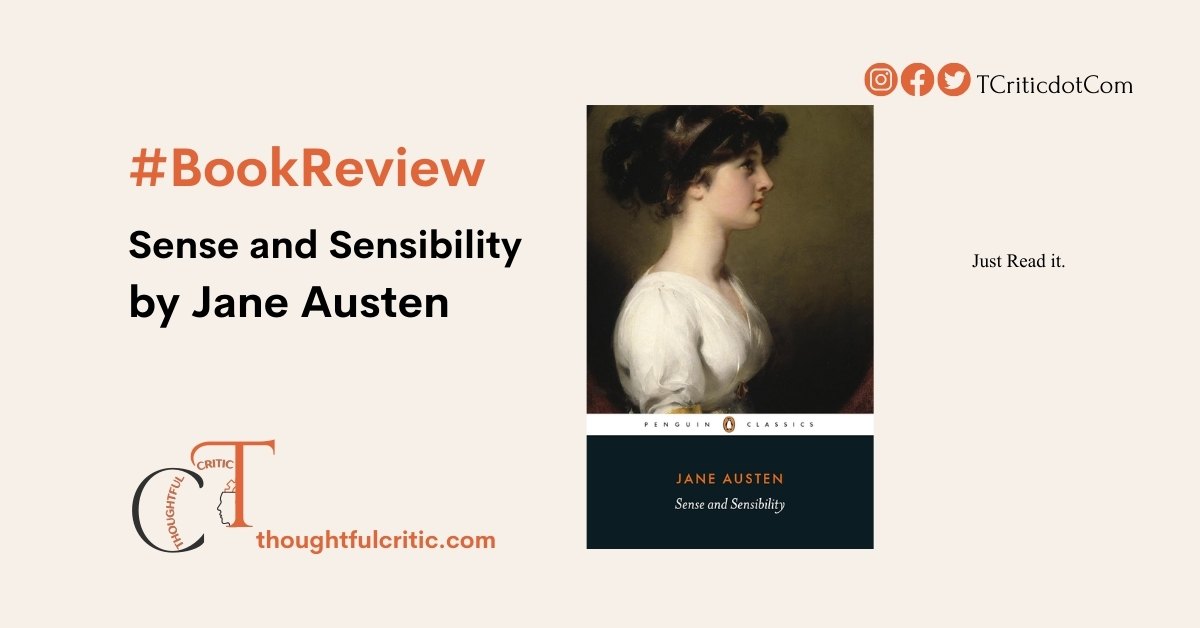Sense and Sensibility by Jane Austen is a tale of love, heartbreak, and endless social drama that could rival your favourite Netflix series. Picture this: two sisters, one ruled by logic (Elinor) and the other by pure emotion (Marianne), navigating the rocky terrain of 19th-century relationships. There are no dating apps, just good old-fashioned misunderstandings, family meddling, and a lot of awkward tea parties.
Elinor is the original cool-headed pragmatist who’d have a killer budget spreadsheet today, while Marianne? She’s all passion and impulse—think of someone who’d ghost you one day and then send a heartfelt 3 a.m. text. Set in a world where marriage is as much about survival as love, Austen throws shade at society’s expectations while crafting a timeless story about finding a balance between heart and head. Whether you’re a romance fan or a drama junkie, this novel has something for everyone!
Read the book review of this timeless classic below. Suppose you are interested, and the bookworm inside you turns. In that case, you can always get a paperback from Amazon India and begin your journey into the emotional world of Austen’s 19th century England!
Title: Sense and Sensibility
Author: Jane Austen
Publication Date: 1811 (first edition)
Publisher: Thomas Egerton (first edition)
Genre: Novel, Romance, Social Commentary
Language: English
Pages: 368 pages (first edition)
Buy the book: Click here to buy from Amazon
First published in 1811, Sense and Sensibility was Jane Austen’s first novel, and it remains a timeless work of English literature. The story explores the lives of the Dashwood sisters, Elinor and Marianne. It contrasts their different approaches to love, life, and social expectations. Austen delves into the complex emotions and practical concerns surrounding love, marriage, and financial security, offering readers a rich commentary on societal norms. This review aims to break down the novel’s themes, narrative style, and character development, offering a comprehensive understanding of why Sense and Sensibility still resonates with readers today.
The Story in Brief
Sense and Sensibility follows the fortunes of the Dashwood family after the death of Mr Dashwood, whose estate is inherited by his son from a previous marriage, leaving his second wife and their three daughters—Elinor, Marianne, and Margaret—in financial difficulty. Forced to move to a more modest home, the Dashwood sisters soon experience the ups and downs of romantic relationships. Elinor, the older sister, embodies “sense,” showing restraint and practical wisdom, especially in her relationship with Edward Ferrars. Marianne, who represents “sensibility,” is passionate and expressive, falling deeply in love with the charming John Willoughby.
The novel tracks the sisters’ emotional journeys, from Marianne’s heartbreak at Willoughby’s abandonment to Elinor’s quiet suffering when she discovers Edward’s engagement to another woman. By the novel’s end, both sisters come to a greater understanding of love and life, finding happiness on their own terms.
Narrative Style
Jane Austen’s signature narrative technique shines in Sense and Sensibility, blending sharp social critique with an engaging romantic plot. The novel is written in the third person, with Austen adopting a free indirect style that allows readers to access the thoughts and feelings of her characters. This style is crucial in highlighting the contrast between the sisters’ internal worlds and their outward behaviour.
Austen’s prose is elegant, witty, and subtly ironic, often poking fun at the rigid social structures of early 19th-century England. This balance between light-hearted humour and more profound social commentary makes the novel enjoyable and thought-provoking.
Themes
- Sense vs. Sensibility: The central theme of the novel is the tension between “sense” (rationality, restraint) and “sensibility” (emotion, spontaneity). Through Elinor and Marianne, Austen explores the benefits and dangers of each approach, ultimately suggesting that a balance between the two is essential for happiness.
- Marriage and Social Status: As with many of Austen’s novels, Sense and Sensibility examines the role of marriage in securing a woman’s social and financial stability. The novel portrays a society where marriage is often more a matter of economic survival than romantic love. Austen critiques this system while acknowledging the pressures it places on her characters.
- Love and Suffering: Elinor and Marianne endure emotional pain due to their romantic entanglements, but they each cope differently. Elinor’s quiet endurance contrasts with Marianne’s open despair. Yet, both experiences are treated with sympathy by Austen, who emphasises that love often comes with suffering.
- Social Class and Wealth: The novel also discusses the importance of wealth and social class in determining one’s social place. The Dashwood sisters are relegated to a lower status after their father’s death, and their romantic prospects are shaped by their reduced financial situation.
Character Development
- Elinor Dashwood: Elinor embodies “sense” in the novel, demonstrating intelligence, self-control, and a deep sense of duty to her family. Throughout the story, she struggles with her feelings for Edward Ferrars, choosing to prioritise his happiness and his engagement to another woman over her own desires. Elinor’s quiet strength and emotional resilience make her a character to admire. By the novel’s end, she is rewarded for her steadfastness.
- Marianne Dashwood: Unlike her sister, Marianne is led by her emotions and passions, representing “sensibility.” Her love for John Willoughby is all-consuming, and his betrayal nearly destroys her. Marianne’s journey is one of self-discovery, as she learns that unchecked passion can lead to heartbreak. By the novel’s conclusion, she has matured into a more balanced and reflective character.
- Edward Ferrars: Edward is a reserved and honourable man who falls in love with Elinor but is bound by a previous engagement to another woman. His internal conflict and sense of duty are central to his character. While he may not be as charismatic as some of Austen’s other leading men, his quiet loyalty and integrity make him a fitting match for Elinor.
- John Willoughby: Willoughby is Marianne’s love interest and the novel’s most charming and deceptive character. His initial attentiveness to Marianne makes him appear the ideal romantic hero. Still, his abandonment of her for a wealthier match reveals his superficial nature. Willoughby’s arc is a cautionary tale about the dangers of relying on first impressions.
- Colonel Brandon: A more mature and reserved suitor for Marianne, Colonel Brandon represents the steady, reliable love that contrasts Willoughby’s fleeting passion. Though Marianne initially rejects his affections, she appreciates his kindness and constancy. By the end of the novel, they are happily married.
Literary Significance
Sense and Sensibility occupies a prominent place in the canon of English literature, not only as Austen’s debut novel but also as a groundbreaking work that helped establish the novel as a serious literary form. Austen’s skilful use of irony, her keen social observations, and her ability to create nuanced, multi-dimensional characters make this novel a classic.
The novel also serves as an early example of the “comedy of manners” genre, in which the behaviours and values of a particular social class are critiqued through witty dialogue and satirical situations. Austen’s exploration of women’s roles in society, especially concerning marriage and wealth, remains relevant today, offering modern readers insight into the limitations and expectations placed on women in the early 19th century.
Critical Analysis
Sense and Sensibility has been the subject of much critical analysis over the years. Some critics have praised Austen’s portrayal of Elinor and Marianne as two sides of the same coin, representing the dual forces of reason and emotion. Others have focused on the novel’s treatment of social class, wealth, and marriage, noting how Austen critiques the systems limiting women’s choices.
While some have accused the novel of being too focused on domestic concerns, others argue that this focus makes it so powerful. Austen uses the private lives of her characters to comment on broader social issues, showing that the personal is always political.
The novel’s enduring popularity is also a testament to Austen’s ability to create real and relatable characters, even two centuries after their creation. Readers continue to be drawn to the emotional journeys of Elinor and Marianne, finding in their stories reflections of their own experiences with love, family, and society.
Appreciation for the Author
Jane Austen’s Sense and Sensibility showcases her mastery of character development, dialogue, and social commentary. Her ability to combine romance with a critique of societal norms sets her apart from her contemporaries. Austen’s characters are not mere caricatures of their time; they are living, breathing individuals whose hopes, dreams, and struggles resonate with readers across generations.
Austen’s wit and insight into human nature are on full display in this novel, and her subtle but sharp critiques of social conventions provide a foundation for many later works of English literature. Sense and Sensibility is a testament to Austen’s enduring influence and remarkable ability to capture the complexities of love, family, and society.
Conclusion
In conclusion, Sense and Sensibility is a beautifully written and richly layered novel that offers readers both an engaging love story and a thoughtful examination of social norms. Austen’s exploration of the tension between reason and emotion and her critique of the marriage market remain relevant today, making this novel a must-read for anyone interested in classic literature. Through the journeys of Elinor and Marianne, Austen reminds us that love and happiness are rarely straightforward. Still, with patience and self-awareness, they can be achieved.
Review of Other Novels by Austen:
Review by Vyom for Thoughtful Critic




